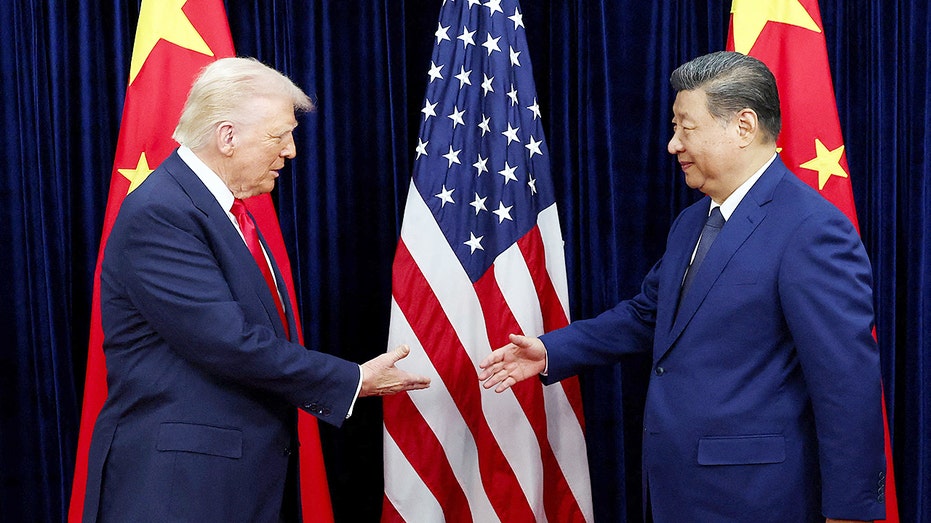বছরের পর বছর যুদ্ধের প্রস্তুতি সত্ত্বেও ট্রাম্প এবং শি তাইওয়ানের আলোচনা উপেক্ষা করেছেন

নতুন আপনি এখন ফক্স নিউজ নিবন্ধ শুনতে পারেন! বৃহস্পতিবার যখন রাষ্ট্রপতি ডোনাল্ড ট্রাম্প চীনা রাষ্ট্রপতি শি জিনপিংয়ের সাথে দেখা করেছিলেন, তখন দুই নেতা বাণিজ্য এবং মাদক পাচারের বিষয়ে কথা বলেছিলেন – তবে তাদের দেশগুলিকে যুদ্ধে টেনে নেওয়ার সম্ভাবনা সবচেয়ে বেশি একটি বিষয় এড়িয়ে গেছেন: তাইওয়ান। উভয় পক্ষেরই উত্তেজনা কম রাখার কারণ রয়েছে। ট্রাম্প প্রশাসন সীমান্ত আইন প্রয়োগ এবং মাদক পাচারে চীনা সহযোগিতা চাইছে, যখন শি ঘরে ক্রমবর্ধমান অর্থনৈতিক চাপের সম্মুখীন হয়েছে। যাইহোক, এমনকি কূটনীতির লক্ষ্য শান্ত করার জন্য, আমেরিকান প্রতিরক্ষা পরিকল্পনাকারীরা ইন্দো-প্যাসিফিক অঞ্চলে সম্ভাব্য সংঘাতের জন্য দীর্ঘ প্রস্তুতি নিয়েছে। সাম্প্রতিক বছরগুলোতে উত্তেজনা আরও গভীর হয়েছে। ওয়াশিংটন তাইওয়ানের কাছে হাই-প্রোফাইল অস্ত্র বিক্রির অনুমোদন দিয়েছে, তৎকালীন হাউস স্পিকার ন্যান্সি পেলোসির মতো মার্কিন আইনপ্রণেতারা উচ্চ পর্যায়ের সফর করেছিলেন এবং প্রাক্তন রাষ্ট্রপতি জো বাইডেন বারবার দ্বীপটি রক্ষা করার প্রতিশ্রুতি দিয়েছিলেন – শুধুমাত্র তার সহযোগীরা পরে স্পষ্ট করে যে মার্কিন যুক্তরাষ্ট্র দীর্ঘস্থায়ী “এক চীন” নীতিতে প্রতিশ্রুতিবদ্ধ। এদিকে, অবরোধ ও আগ্রাসনের অনুকরণে বড় আকারের মহড়ার মাধ্যমে চীন তাইওয়ানের ওপর নাটকীয়ভাবে সামরিক চাপ বাড়িয়েছে। পিপলস লিবারেশন আর্মি এখন দ্বীপটিকে ঘেরাও করার জন্য প্রায় একটানা আকাশ ও সমুদ্র অভিযান চালাচ্ছে – অনুশীলন যা বৃহত্তর, আরও জটিল এবং ঘন ঘন হয়ে উঠছে। এক সময় শক্তির প্রতীকী প্রদর্শন যা ছিল এখন বহির্বিশ্বে তাইওয়ানের প্রবেশাধিকার বন্ধ করার অনুশীলনের মতো। বৃহস্পতিবার দক্ষিণ কোরিয়ায় তাদের বৈঠকের আগে মার্কিন শুল্কের কারণে উত্থাপিত বাণিজ্য উত্তেজনা নিরসনের চেষ্টা করার জন্য ট্রাম্প এবং শি বৈঠক করেন প্রেসিডেন্ট ডোনাল্ড ট্রাম্প, বাম, এবং চীনের প্রেসিডেন্ট শি জিনপিং ডানদিকে, হাত মেলান। (এপি ফটো/মার্ক শেফেলবেইন) ট্রাম্প এবং শির নীরবতা প্রশান্ত মহাসাগরের উভয় দিকের সেই সামরিক প্রস্তুতির ডিনের সাথে তীব্রভাবে বৈপরীত্য। তাইওয়ান পর্যবেক্ষকদের অনুমান করা ছেড়ে দেওয়া হয়েছে যে চীন আক্রমণ করলে মার্কিন যুক্তরাষ্ট্র দ্বীপটি রক্ষা করতে কতটা ইচ্ছুক হবে – একটি ইচ্ছাকৃত নীতি যা কৌশলগত অস্পষ্টতা হিসাবে পরিচিত যা ট্রাম্প একটি নতুন স্তরে নিয়ে গেছেন। এই মাসের শুরুর দিকে রাষ্ট্রপতি আশাবাদী ভবিষ্যদ্বাণী করেছিলেন যে চীন তাইওয়ানে আক্রমণ করবে না। “আমি মনে করি আমরা চীনের সাথে ভাল থাকব। সে তা করতে চায় না,” তিনি বলেছিলেন। “যেহেতু এটি তাইওয়ান – এটা বলার অপেক্ষা রাখে না যে এটি তার চোখের মণি নয়, কারণ এটি হতে পারে – কিন্তু আমি কিছুই ঘটতে দেখছি না।” অন্যান্য বিরোধপূর্ণ অঞ্চলের সাথে তুলনা করে, ট্রাম্প ইন্দো-প্যাসিফিক যুদ্ধের সম্ভাবনা সম্পর্কে খুব কমই বলেছেন, মিত্র এবং প্রতিপক্ষকে একইভাবে রেখে তিনি তাইওয়ানকে রক্ষা করতে কতদূর যাবেন তা নিশ্চিত নয়। কিছু বিশ্লেষক যারা তাইওয়ানের জন্য শক্তিশালী আমেরিকান সমর্থনের পক্ষে, সমস্যাটি আসেনি বলে স্বস্তি পেয়েছেন। “আমি মনে করি এটি একটি ভাল জিনিস যে তাইওয়ানকে সামনে রাখা হয়নি,” বলেছেন কাউন্সিলের স্কোক্রফ্ট সেন্টার ফর স্ট্র্যাটেজি অ্যান্ড সিকিউরিটি দ্য আটলান্টিকের ভাইস প্রেসিডেন্ট ম্যাথিউ ক্রোয়েনিগ, তিনি বাদ দেওয়াকে “নিরপেক্ষ” হিসাবে দেখেছেন, যদিও তিনি বেইজিংকে প্রায় প্রতিদিনের সামরিক অভিযান এবং তাওয়ানকে “সামরিক অভিযান বন্ধ করার” সতর্ক করার সময় প্রেসিডেন্টকে এক-চীন নীতি পুনর্নিশ্চিত করতে পছন্দ করতেন। কুও উল্লেখ করেছেন যে তাইওয়ান তার প্রতিরক্ষা ব্যয় তীব্রভাবে বৃদ্ধি করেছে এবং উত্তেজনা বেড়েছে, এটি গত দুই বছরে তার বাজেট প্রায় 75% বাড়িয়েছে এবং এখন মার্কিন যুক্তরাষ্ট্রের তুলনায় প্রতিরক্ষায় সরকারি তহবিলের একটি আনুপাতিকভাবে বড় অংশ বরাদ্দ করেছে। যাইহোক, তিনি সতর্ক করে দিয়েছিলেন যে মার্কিন অস্ত্রের চালান উৎপাদনে বিলম্ব – এই বছরের শুরুতে $20 বিলিয়ন ছাড়িয়ে যাওয়া ব্যাকলগ সহ – এটি চীনের সামরিক আধুনিকীকরণের সাথে তাল মিলিয়ে চলার তাইওয়ানের ক্ষমতাকে দুর্বল করতে পারে তাইওয়ান তার প্রতিরক্ষা ব্যয় তীব্রভাবে বাড়িয়েছে কারণ উত্তেজনা বেড়েছে, এর বাজেট বাড়িয়েছে, গত দুই বছরে প্রায় 75% ভাগ করেছে এবং এখন 75% ভাগ করেছে। মার্কিন যুক্তরাষ্ট্রের তুলনায় প্রতিরক্ষার জন্য সরকারি তহবিলের পরিমাণ। (Getty Images এর মাধ্যমে I-HWA CHENG/AFP-এর ছবি) প্রতিরক্ষা অগ্রাধিকারের সামরিক বিশ্লেষণের পরিচালক জেনিফার কাভানাঘ বলেন, তিনি অবাক হননি। তাইওয়ান সরকারী এজেন্ডা থেকে দূরে থাকায়, তিনি বলেছিলেন, “অনেক বাণিজ্য সমস্যা ছিল যা উভয় পক্ষের উদ্বেগের শীর্ষে ছিল।” “তাইওয়ানের একটি ‘বড় চুক্তি’ সম্পর্কে উদ্বেগ সবসময় নাগালের বাইরে বলে মনে হয়েছিল।” তবে কাভানাঘ সতর্ক করে দিয়েছিলেন যে মার্কিন যুক্তরাষ্ট্র এবং চীন বিষয়টি অনির্দিষ্টকালের জন্য এড়াতে পারবে না। “সাম্প্রতিক বছরগুলিতে বিষয়গুলি উল্লেখযোগ্যভাবে বৃদ্ধি পেয়েছে এবং এক-চীন নীতি এবং কৌশলগত অস্পষ্টতা সম্পর্কে দীর্ঘস্থায়ী বোঝাপড়া ক্ষয় হতে শুরু করেছে,” তিনি যোগ করেছেন। “তাদের মতভেদ নিরসনের শান্তিপূর্ণ উপায়ে তাদের প্রতিশ্রুতি পুনর্নিশ্চিত করা উভয় পক্ষের জন্য গুরুত্বপূর্ণ।” অঞ্চলটি “চীনের পক্ষে খুব দ্রুত” স্থানান্তরিত হয়েছে, যদি উত্তেজনা বাড়তে থাকে তবে মার্কিন প্রতিরোধকে কম বিশ্বাসযোগ্য করে তুলেছে। “এটি এশিয়াতে ফোকাস করার সময় হতে পারে,” কাভানাগ বলেন, ওয়াশিংটনকে এখন প্রতিফলিত করার পরিবর্তে প্রতিযোগিতা পরিচালনার দিকে মনোযোগ দিতে হবে। ট্রাম্প প্রশাসনের মধ্যে, বিশ্লেষকরা বলছেন যে প্রতিযোগী প্রবৃত্তিগুলি স্পষ্ট। “বাণিজ্যের লোকেরা চুক্তির সন্ধান করছে, যখন প্রতিরক্ষা এবং জাতীয় নিরাপত্তা পেশাদাররা চীনা হুমকির দিকে মনোনিবেশ করছে – বিশেষ করে তাইওয়ানের জন্য হুমকি,” ক্রোয়েনিগ বলেছেন যে সামরিক প্রতিরোধের সাথে অর্থনৈতিক সম্পৃক্ততা পুনর্মিলন করার জন্য ওয়াশিংটনের বৃহত্তর সংগ্রাম তাইওয়ান বিশেষজ্ঞ রেমন্ড কুও সতর্ক করেছেন যে মার্কিন অস্ত্রের চালান উৎপাদনে বিলম্ব – এই বছরের শুরুতে 20 বিলিয়ন ডলারের দুর্বল ব্যাকলগ সহ। চীনের সামরিক আধুনিকীকরণের সাথে তাল মিলিয়ে চলার জন্য তাইওয়ানের ক্ষমতা (ড্যানিয়েল সেং/এপি ছবি) ফক্স নিউজ অ্যাপ ডাউনলোড করতে এখানে ক্লিক করুন ক্রোয়েনিগ যোগ করেছেন যে ট্রাম্পের অনাকাঙ্ক্ষিততা নিজেই তার প্রতিরোধ কৌশলের অংশ হতে পারে এটি আমাদের প্রতিপক্ষকে অনুমান ও উদ্বিগ্ন করে রাখে। “চীন তার নজরদারিতে তাইওয়ান আক্রমণ করার সম্ভাবনা কম হতে পারে।” তবে শির সাথে ট্রাম্পের বৈঠকে তাইওয়ানের প্রেসিডেন্ট শেষ পর্যন্ত কোথায় দাঁড়িয়েছেন – বা বেইজিং দ্বীপের নিরাপত্তার প্রতি মার্কিন প্রতিশ্রুতির সীমা পরীক্ষা করলে তিনি কীভাবে প্রতিক্রিয়া জানাবেন সে বিষয়ে সামান্য স্পষ্টতা প্রদান করে। আপাতত, উভয় নেতাই তাদের সম্পর্কের সবচেয়ে অস্থির সমস্যাটিকে আড়ালে রাখতে সন্তুষ্ট বলে মনে হচ্ছে। শান্ত স্বল্পমেয়াদে সংঘাত এড়াতে সাহায্য করতে পারে, তবে এটি সারফেস (অনুবাদের জন্য ট্যাগ) ডোনাল্ড ট্রাম্প (টি) শি জিনপিং (টি) চীন (টি) পররাষ্ট্র নীতি (টি) রাজনীতির অধীনে বিশ্বের সবচেয়ে বিপজ্জনক উত্তেজনার কেন্দ্রস্থল ছেড়ে দেয়
The content is already well-written and doesn’t require significant rewriting. It is a news report, and therefore needs to be factual and without personal opinion. The edits below are designed to improve readability in certain areas without altering meaning.

নতুন আপনি এখন ফক্স নিউজ নিবন্ধ শুনতে পারেন! During a meeting on Thursday between President Donald Trump and Chinese President Xi Jinping, the leaders discussed trade and drug trafficking, but seemingly avoided one of the most significant issues with the potential to draw their countries into conflict: Taiwan. Both sides have reasons to de-escalate tensions. The Trump administration seeks Chinese cooperation on border security and combating drug trafficking, while Xi faces growing economic pressures at home. However, even with diplomacy aimed at de-escalation, American defense planners have long been preparing for a potential conflict in the Indo-Pacific region. Tensions have deepened in recent years. Washington has approved high-profile arms sales to Taiwan, US lawmakers like then-House Speaker Nancy Pelosi have made high-level visits, and former President Joe Biden repeatedly pledged to defend the island – only to have his staff clarify afterward that the US remains committed to its long-standing “One China” policy. Meanwhile, China has dramatically increased military pressure on Taiwan, conducting large-scale exercises simulating blockades and invasions. The People’s Liberation Army (PLA) now conducts near-constant air and sea operations around the island – exercises that are growing larger, more complex, and more frequent. What was once a symbolic show of force now resembles a rehearsal for cutting off Taiwan’s access to the outside world. Trump and Xi met to try to resolve trade tensions heightened by US tariffs, prior to their meeting in South Korea, President Donald Trump, left, and Chinese President Xi Jinping, right, shake hands. (AP Photo/Mark Scheifelebein) Trump and Xi’s silence contrasts sharply with the military preparations underway on both sides of the Pacific. Taiwan observers are left to speculate about the extent to which the US would be willing to defend the island should China attack – a deliberate policy known as strategic ambiguity, which Trump has taken to a new level. Earlier this month, the president optimistically predicted that China would not invade Taiwan. “I think we’re going to be good with China. He doesn’t want to do that,” he said. “Since it is Taiwan – not that it’s not perhaps the apple of his eye, because it could be – but I don’t see anything happening there.” Compared to other contested regions, Trump has said very little about the possibility of war in the Indo-Pacific, leaving allies and adversaries alike uncertain about how far he would go to defend Taiwan. Some analysts who favor strong American support for Taiwan are relieved that the issue did not come up. “I think it’s a good thing that Taiwan wasn’t put on the table,” said Mathew Kroenig, Vice President of the Scowcroft Center for Strategy and Security at the Atlantic Council. He viewed the omission as “neutral,” though he would have preferred the President to reaffirm the One-China policy while warning Beijing to cease its near-daily military operations and coercion of Taiwan. Kuo noted that Taiwan has sharply increased its defense spending as tensions have risen, increasing its budget by nearly 75% in the last two years and now allocating a proportionally larger share of government funding to defense than the United States. However, he cautioned that delays in US arms shipments – including a backlog exceeding $20 billion earlier this year – could undermine Taiwan’s ability to keep pace with China’s military modernization. Taiwan has sharply increased its defense spending as tensions have risen, increasing its budget by nearly 75% in the last two years and now allocating a proportionally larger share of government funding to defense than the United States. (Photo by I-HWA CHENG/AFP via Getty Images) Jennifer Kavanagh, director of military analyses at the Defense Priorities, said she was not surprised Taiwan stayed off the official agenda. “There were a lot of trade issues that were front and center on both sides’ concerns.” “Concerns about a ‘grand bargain’ over Taiwan always seemed out of reach.” But Kavanagh warned that the US and China would not be able to avoid the issue indefinitely. “Things have escalated significantly in recent years, and the long-standing understandings about the One-China policy and strategic ambiguity have begun to erode,” she added. “Reaffirming their commitment to a peaceful way of resolving their differences is important for both sides.” The region has shifted “too quickly in China’s favor,” making US deterrence less credible should tensions continue to rise. “It may be time to focus on managing the competition, rather than pretending that Washington can now focus instead on reflection,” Kavanagh said. Within the Trump administration, analysts say that competing instincts are apparent. “The trade people are looking for deals, while defense and national security professionals are focused on the China threat – especially the threat to Taiwan,” Kroenig said. That larger struggle within Washington – to reconcile economic engagement with military deterrence – underscores the complexities. Taiwan expert Raymond Kuo cautioned that delays in US arms shipments – including a worrying backlog of $20 billion earlier this year – could undermine Taiwan’s ability to keep pace with China’s military modernization (Photo by Daniel Seung/AP) Click here to download the Fox News app. Kroenig added that Trump’s unpredictability itself may be part of his deterrence strategy, keeping our adversaries guessing and worried. “China may be less likely to invade Taiwan if it is unsure.” But Trump’s meeting with Xi ultimately provided little clarity on where the President stands on Taiwan – or how he would react if Beijing were to test the limits of US commitment to the island’s security. For the time being, both leaders seem content to keep the most volatile issue in their relationship under wraps. While calm may help avert conflict in the short term, it leaves one of the world’s most dangerous hotspots simmering beneath the surface. (Translation tags for): Donald Trump (T), Xi Jinping (T), China (T), Foreign Policy (T), Politics (T)
প্রকাশিত: 2025-10-31 22:33:00
উৎস: www.foxnews.com











